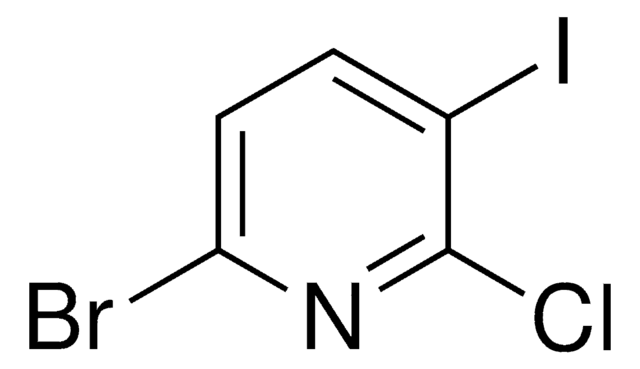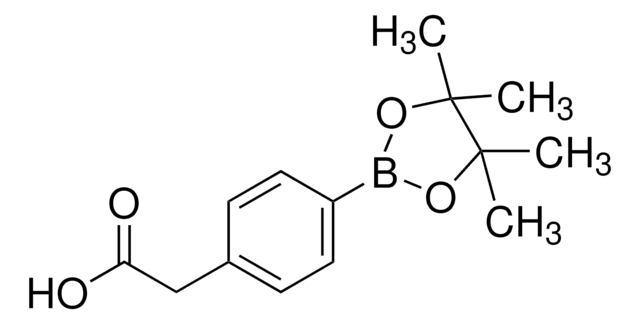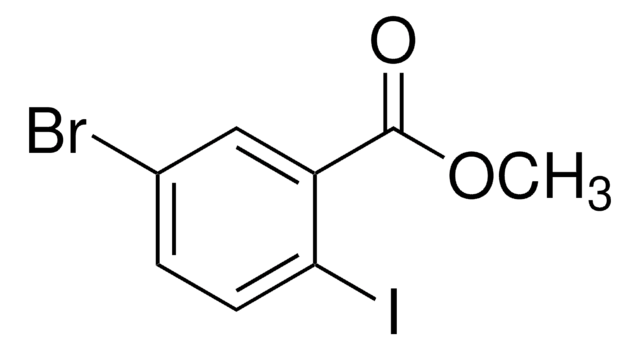The storage conditions that a Sigma-Aldrich catalog and label recommend for products are deliberately conservative. For many products, long-term storage at low temperatures will increase the time during which they are expected to remain in specification and therefore are labeled accordingly. Where short-term storage, shipping time frame, or exposure to conditions other than those recommended for long-term storage will not affect product quality, Sigma-Aldrich will ship at ambient temperature. The products sensitive to short-term exposure to conditions other than their recommended long-term storage are shipped on wet or dry ice. Ambient temperature shipping helps to control shipping costs for our customers. At any time, our customers can request wet- or dry-ice shipment, but the special handling is at customer expense if our product history indicates that the product is stable for regular shipment.
697095
2-Chloropyridine-3-boronic acid
Synonyme(s) :
(2-Chloro-3-pyridyl)boronic acid, (2-Chloropyridin-3-yl)boronic acid, Dihydroxy(2-chloro-3-pyridyl)borane
About This Item
Produits recommandés
Forme
powder
Pf
121-134 °C
Groupe fonctionnel
chloro
Température de stockage
2-8°C
Chaîne SMILES
OB(O)c1cccnc1Cl
InChI
1S/C5H5BClNO2/c7-5-4(6(9)10)2-1-3-8-5/h1-3,9-10H
Clé InChI
VRDAOVQZVXYRNH-UHFFFAOYSA-N
Vous recherchez des produits similaires ? Visite Guide de comparaison des produits
Application
- Synthesis of Et canthinone-3-carboxylates from Et 4-bromo-6-methoxy-1,5-naphthyridine-3-carboxylate via a Pd-catalyzed Suzuki-Miyaura coupling and a Cu-catalyzed amidation reaction
- Preparation of arylmethylpyrrolidinylmethanols and amine derivatives via reaction with MIDA followed by Suzuki reaction with halides or amination with amines
- Preparation of arylazabicyclooctane derivatives as potential arginine vasopressin receptor antagonists
- Regioselective preparation of halo-oligopyridines and oligopyridines by the Suzuki-Miyaura cross-coupling reaction
Mention d'avertissement
Warning
Mentions de danger
Conseils de prudence
Classification des risques
Eye Irrit. 2 - Skin Irrit. 2 - STOT SE 3
Organes cibles
Respiratory system
Code de la classe de stockage
11 - Combustible Solids
Classe de danger pour l'eau (WGK)
WGK 3
Point d'éclair (°F)
Not applicable
Point d'éclair (°C)
Not applicable
Équipement de protection individuelle
dust mask type N95 (US), Eyeshields, Gloves
Faites votre choix parmi les versions les plus récentes :
Certificats d'analyse (COA)
Vous ne trouvez pas la bonne version ?
Si vous avez besoin d'une version particulière, vous pouvez rechercher un certificat spécifique par le numéro de lot.
Déjà en possession de ce produit ?
Retrouvez la documentation relative aux produits que vous avez récemment achetés dans la Bibliothèque de documents.
-
How does the storage temperature relate to shipping conditions?
1 réponse-
Utile ?
-
-
What is the pKa of Product 697095, 2-Chloropyridine-3-boronic acid?
1 réponse-
The pKa of most boronic acids is approximately 9.
Utile ?
-
-
What compounds are formed when boronic acids degrade?
1 réponse-
Boronic acids are typically very stable. However, if degradation occurs, Boronic acid will degrade to corresponding alcohol and boric acid.
Utile ?
-
-
What is the Department of Transportation shipping information for this product?
1 réponse-
Transportation information can be found in Section 14 of the product's (M)SDS.To access the shipping information for this material, use the link on the product detail page for the product.
Utile ?
-
-
What is it about boronic acids that makes them acidic?
1 réponse-
Boronic acids have a vacant p orbital. Therefore, despite the presence of two hydroxyl groups, the acidic character of most Boronic acids is that of a Lewis acid.
Utile ?
-
-
How can you determine if boronic acid anhydride is present? And if it is found to be present, how do you remove it?
1 réponse-
Typically anhydride formation may be detected when the inside drying flask temperature increases abnormally, color change, or free flowing solid looks wet. To remove the anhydrides, charge de-oxygenated deionized (DI) water to the flask, and make slurry. Filter under nitrogen pressure, and use more de-oxygenated DI water for rinsing the solids. Then wash the solids with a solvent the product is insoluble in. Finally, dry the product with moist nitrogen.
Utile ?
-
-
What is the solubility for Product 697095, 2-Chloropyridine-3-boronic acid?
1 réponse-
Unfortunately, we do not test the solubility for this product. However, a similar product (Product No. 634492) is soluble in THF at 25 mg/mL, and is very insoluble in DMSO.
Utile ?
-
Filtres actifs
Notre équipe de scientifiques dispose d'une expérience dans tous les secteurs de la recherche, notamment en sciences de la vie, science des matériaux, synthèse chimique, chromatographie, analyse et dans de nombreux autres domaines..
Contacter notre Service technique![[1,1′-bis(diphénylphosphino)ferrocène]dichloropalladium(II)](/deepweb/assets/sigmaaldrich/product/structures/130/734/8846aa26-1858-458a-998d-8c306c13bf0f/640/8846aa26-1858-458a-998d-8c306c13bf0f.png)






![[1,1′-Bis(diphénylphosphino)ferrocène]dichloropalladium(II), complexe avec le dichlorométhane](/deepweb/assets/sigmaaldrich/product/structures/825/986/4317978b-1256-4c82-ab74-6a6a3ef948b1/640/4317978b-1256-4c82-ab74-6a6a3ef948b1.png)


